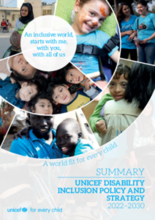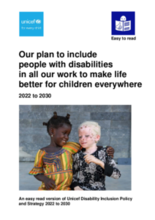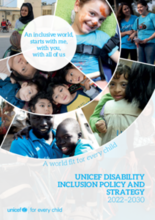Highlights
The DIPAS was developed through intensive internal and external consultations, including UN Agencies, governments, Organizations of Persons with Disabilities, and youth with disabilities and it is guided by the Convention on the Rights of Persons with Disabilities (CRPD), the Convention on the Rights of the Child (CRC) and the United Nations Disability Inclusion Strategy (UNDIS).
The vision of the UNICEF DIPAS is a more inclusive world by 2030 where all children, including those with disabilities, live in barrier-free and inclusive communities.
The DIPAS sets out six strategic priorities: prevention of stigma and discrimination; improvement of disability-inclusive services, programmes and workplaces; access to comprehensive community care and support services; access to assistive technology; disability-inclusive action in humanitarian, emergency and fragile contexts; full and meaningful participation of persons with disabilities.
The DIPAS is the roadmap for greater cross-sectoral coordination for disability inclusion to be mainstreamed across the organization at every level to meet the needs of the world’s 240 million children with disabilities.
“UNICEF’s Disability Inclusion Policy and Strategy sets a bold vision and clear targets for the entire Organization to advance disability inclusion. We need YOU – your commitment and actions – to ensure that every child with a disability has the same opportunities as their peers without disabilities. Change starts with me, with you, with all of us.” – Catherine Russell, Executive Director of UNICEF
Under DIPAS, UNICEF commits:
1. By 2025, UNICEF will increase, by at least 2 per cent, its organizational budget expenditure, to progressively accelerate disability inclusion across its programmes and operations, in both development and humanitarian action, committing to a target of 10 per cent of total expenditure by the year 2030.
2. By 2025, UNICEF will progressively increase the number of employees with disabilities by at least 2 per cent across all offices, with the aim of reaching 7 per cent representation by 2030.
3. By 2025, all UNICEF regional offices will have at least one dedicated full-time disability specialist for programmes and operations, to coordinate and support disability inclusion in the region.
4. By 2025, 75 per cent of UNICEF staff will have undergone training on disability inclusion.
5. UNICEF will Generate evidence from data insights and research through dedicated capacity (i.e. The Centre of Excellence on Data for Children with Disabilities) to guide programme design and investments.
6. UNICEF will systematically mainstream disability inclusion, specifically of children with disabilities, into media communications and advocacy.
7. By December 2023, UNICEF regional and headquarters Divisional Directors will have developed divisional/regional action plans on DIPAS.



